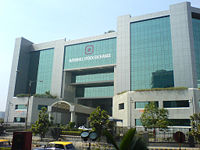Stock Exchanges of India
India has Three national level stock exchanges, other regional stock exchanges not mentioned here. 1. National Stock Exchange of "India", 2. Bombay Stock Exchange of India, 3. United Stock Exchange of India.

The "National Stock Exchange" of India was promoted by leading Financial companies at the behest of the of Indian Government. NSE was incorporated in November 1992 as a tax-paying company. National Stock Exchange was recognized as a "Stock Exchange" under the Securities Contracts (Regulation) Act, 1956, In April 1993. The Capital market (Stocks) cash segment of the NSE commenced operations in November 1994. Trading in the Derivatives(Futures and Options) segment commenced in June 2000, Located in Mumbai.

"Bombay Stock Exchange" is the first exchange in Asia. BSE became the first stock exchange to be recognized by the Indian Government under the Securities Contracts Regulation Act. The Bombay Stock Exchange developed the BSE Sensex in 1986. Bombay Stock Exchange switched to an electronic trading system in 1995 and Introduced new Technology automated, screen-based trading platform called BSE On-line trading (BOLT). BSE(Bombay Stock Exchange) has also introduced the world's first centralized exchange-based internet trading system. The BSE now housed in Phiroze Jeejeebhoy Towers at Dalal Street, Fort area, Mumbai.

"United Stock Exchange of India" (USE) is an new Indian stock exchange. USE has received final approval from the stock market regulator SEBI to start currency futures trading.
USE represents the commitment of 21 Indian public and private sector banks, corporate houses to build an institution. USE also has Bombay Stock Exchange as a strategic partner.
leading Public Sector Banks that are shareholders of USE include State Bank of India, Bank of Baroda, IDBI Bank, Syndicate Bank, Bank of India, Dena Bank, Union Bank of India, Canara Bank, Oriental Bank of Commerce, United Bank of India, Indian Bank, UCO Bank, Bank of Maharashtra, Indian Overseas Bank, Allahabad Bank, Corporation Bank, Punjab National Bank, Andhra Bank, Central Bank of India, Punjab and Sind Bank, Vijaya Bank. Private Sector Banks like ICICI Bank, Axis Bank, HDFC Bank, Federal Bank, J & K Bank. Corporate Institutions such as Jaypee Capital, MMTC and India Potash are also connected with United Stock Exchange of India.
National Stock Exchange

The "National Stock Exchange" of India was promoted by leading Financial companies at the behest of the of Indian Government. NSE was incorporated in November 1992 as a tax-paying company. National Stock Exchange was recognized as a "Stock Exchange" under the Securities Contracts (Regulation) Act, 1956, In April 1993. The Capital market (Stocks) cash segment of the NSE commenced operations in November 1994. Trading in the Derivatives(Futures and Options) segment commenced in June 2000, Located in Mumbai.
Bombay Stock Exchange

"Bombay Stock Exchange" is the first exchange in Asia. BSE became the first stock exchange to be recognized by the Indian Government under the Securities Contracts Regulation Act. The Bombay Stock Exchange developed the BSE Sensex in 1986. Bombay Stock Exchange switched to an electronic trading system in 1995 and Introduced new Technology automated, screen-based trading platform called BSE On-line trading (BOLT). BSE(Bombay Stock Exchange) has also introduced the world's first centralized exchange-based internet trading system. The BSE now housed in Phiroze Jeejeebhoy Towers at Dalal Street, Fort area, Mumbai.
United Stock Exchange

"United Stock Exchange of India" (USE) is an new Indian stock exchange. USE has received final approval from the stock market regulator SEBI to start currency futures trading.
USE represents the commitment of 21 Indian public and private sector banks, corporate houses to build an institution. USE also has Bombay Stock Exchange as a strategic partner.
leading Public Sector Banks that are shareholders of USE include State Bank of India, Bank of Baroda, IDBI Bank, Syndicate Bank, Bank of India, Dena Bank, Union Bank of India, Canara Bank, Oriental Bank of Commerce, United Bank of India, Indian Bank, UCO Bank, Bank of Maharashtra, Indian Overseas Bank, Allahabad Bank, Corporation Bank, Punjab National Bank, Andhra Bank, Central Bank of India, Punjab and Sind Bank, Vijaya Bank. Private Sector Banks like ICICI Bank, Axis Bank, HDFC Bank, Federal Bank, J & K Bank. Corporate Institutions such as Jaypee Capital, MMTC and India Potash are also connected with United Stock Exchange of India.












No comments:
Post a Comment